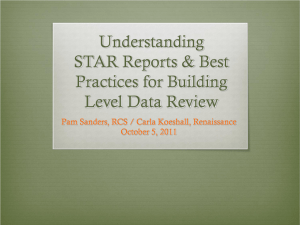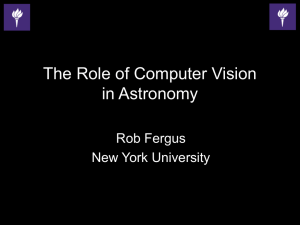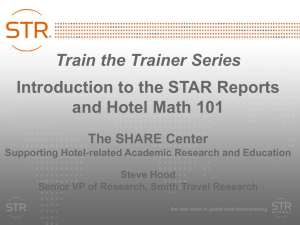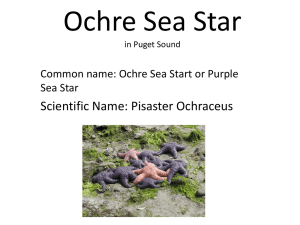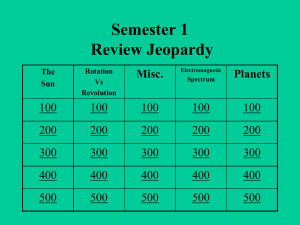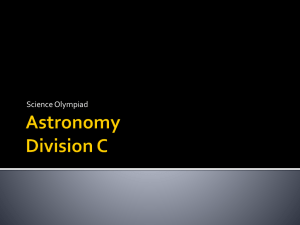STAR Training of Trainers
advertisement
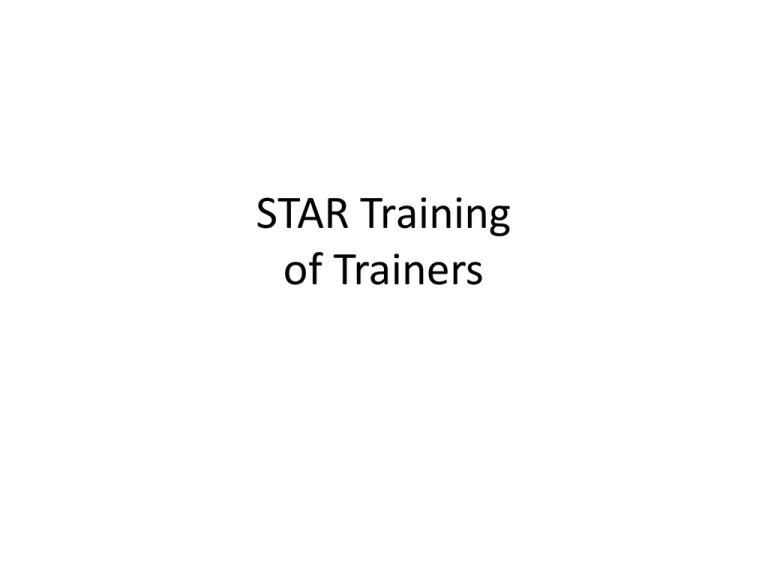
STAR Training of Trainers What is a computer adaptive test? Too low Appropriate content Too high Traditional Assessments are Imprecise Above and Below Grade Level Sixth grade reading assessment Below sixth grade Sixth grade test items Above sixth grade CAT: Precise at All Levels Sixth grade reading assessment Below sixth grade Sixth grade test items Above sixth grade STAR Early Literacy • • • • • • • General readiness Graphophonemic awareness Phonemic awareness Phonics Vocabulary Comprehension Structural analysis STAR Reading • • • • Vocabulary in context Comprehension Instructional reading level Independent reading range STAR Reading tests comprehension Background knowledge Construct meaning from text Vocabulary knowledge STAR Math tests competency in eight mathematical strands Numeration Computation Estimation Algebra Word Problems Geometry Measurement Data analysis & statistics Scaled Score (SS) 0 SS 900 SS 615 1400 SS Percentile Rank (PR) 1 PR 99 PR 52 Grade Level Equivalent Score (GE) 0.1 GE 12.9 GE 4.8 Two types of growth Scaled Score: Absolute Growth Percentile Rank: Relative Growth Estimated Oral Reading Fluency A New Measure in STAR-EL and STAR Reading STAR and Est. ORF • Resulted from a correlational study looking at – STAR (EL and Reading) scores – and DIBELS Oral Reading Fluency • Statistically HUGE sample – N=12,220 What a correlation! What a correlation! Notice What Happens G4 – R=0.71 G3 – R=0.78 G2 – R=0.84 G1- R=0.87 Diagnostic Information Reasons for score fluctuation Standard Error of Measurement (chance) Fluctuation in student performance (good day, bad day) Regression to the mean (statistical phenomenon) Fidelity of Administration Pre-Test Instructions Item Time Limits Grades K - 2 3 minutes per item 60 seconds per item Grades 3 + 45 seconds Short comprehension 90 seconds Extended comprehension 90 seconds per item 24 Using STAR in an RtI Setting Progress shown Lack of progress Data Review Progress Monitoring with STAR Intervention B Intervention A (Tier 2) Data Review Screening with STAR Core Instructional Program (Tier 1) 26 Screening Report A Math Report 1. Are you satisfied with the number/percent of students in your class/grade who are at or above proficiency? Is core instruction effective? 2. Some students are in the “red.” Based on your opinion of the student(s) and other information you have, is this student in need of “urgent intervention?” 3. Some students (blue) are “on watch” or “almost” at benchmark. Which of these are you “worried about” and which do you think will progress with continued core instruction? 4. What is being done or what do you think needs to be done for those students in need of “intervention” (Yellow)? George Batsche Screening • “The testing needs to be brief, easy to administer, reliable, and valid” (Applebaum, 2009, p. 4) • “Screening is a type of assessment that is characterized by providing quick, low-cost, repeatable testing of age-appropriate critical skills or behaviors” (NRCLD, 2006, p. 1.2) • “For a screening measure to be useful, it should. . . be practical” (NRCLD, 2006, 1.2) Clean the Fish Tank! • If the water in the fish tank is dirty, you don’t start taking our individual fish and diagnosis their needs. You clean the fish tank! Heather Diamond, FL Department of Ed. Progress Monitoring Student Growth in PR and SS 486 SS 23 PR 485 SS 484 SS 483 SS 482 SS 481 SS 480 SS 479 SS 22 PR 478 SS 477 SS Meta-skill assessments & single skill probes STAR Assessments measure skills as a whole Individual probes measure skill on isolated tasks Progress Monitoring It is a common misconception that accurate measure of the isolated skills requires an explicit, separate test for each skill. On the contrary, since the sub skills in a given domain are highly interrelated, sub skills scores can be derived more accurately—and more efficiently—from student’s overall test performance, which provides far more data from more items than a short probe. Goal Setting Star Hosted Data The Statistics Behind the Goal-Setting Wizard 1st K 1 2 3 4 5 6 7 8 9 10 11 12 2nd 3rd 4th 5th 6th 7th 8th 9th 10th Goal-Setting Rate to Maintain 11PR = 2.0 Rate to Meet Benchmark = 7.0 Moderate Goal = 3.3 Ambitious Goal = 5.5 Not responding to the intervention Check the fidelity of implementation Give the intervention more time to work Increase the intensity of the intervention Try a new intervention Editing a goal Give the intervention more time to work Starting a new intervention Try a new intervention How is Y responding to the new intervention? STAR Early Literacy STAR Math STAR Reading Very Highly Rated for Both Screening and Progress Monitoring by the National Center for Response to Intervention www.rti4success.org High rating from National Center on RTI Screening Tools Chart (partial) www.rti4success.org High rating from National Center on RTI Progress Monitoring Tools Chart (partial) www.rti4success.org • • • • Resources Software: manuals, Live Chat Phone: (800) 338-4204 Email: answers@renlearn.com Renaissance Training Center: www.renlearn.com/profdevel • Getting the Most out of STAR Guides 55 RtI Experts Dr. George Batsche Dr. Matt Burns Dr. Ted Christ Dr. Joe Kovaleski University of South Florida University of Minnesota University of Minnesota Indiana Univ of PA Dr. Ed Shapiro Dr. Amanda VanDerHeyden Lehigh University Consultant Dr. Jim Ysseldyke University of Minnesota
